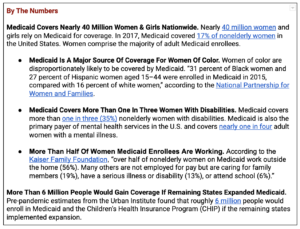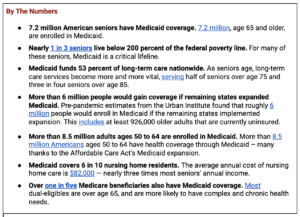April is Medicaid Awareness Month, and Protect Our Care hosted nationwide events to recognize the crucial role Medicaid plays in Americans’ health care and highlight recent efforts to expand Medicaid programs in the states that have yet to enact expansion. Protect Our Care was joined by U.S. Senator Tammy Baldwin (D-WI), U.S. Representatives Tim Ryan (D-OH-13), Gwen Moore (D-WI-04), Lt. Governor Mandela Barnes (D-WI), as well as other local elected officials, storytellers, and health care advocates in Alaska, Florida, Georgia, Maine, North Carolina, Ohio, West Virginia, and Wisconsin.
During Medicaid Awareness Month, Protect Our Care also launched a campaign to push the Republican governors and state legislators in the 14 holdout states to accept the additional funds now available to them through the American Rescue Plan to expand Medicaid. POC released a series of reports including Florida, Georgia, North Carolina, Wisconsin, and Texas. The campaign — featuring a website and digital ads — will also hold Republicans in Congress accountable for their votes against the American Rescue Plan and their efforts to sabotage Medicaid at every turn.
Throughout the month, Protect Our Care also released a series of reports on how Medicaid is a lifeline for children and families, communities of color, people with disabilities, seniors and older adults, and women.

Here’s a look at the activities and some of the news coverage that took place over Medicaid Awareness Month:
ALASKA
Wednesday, April 5, 2021 — Medicaid Awareness Month Virtual Event with State Rep. Spohnholz, Alaska Children’s Trust, and Advocates: Rep. Ivy Spohnholz, Alaska Children’s Trust CEO and Executive Director Trevor Storrs and advocates Erin Kirkland and Carolyn Savina Allen, joined Protect Our Care Alaska for a virtual press conference to discuss how the American Rescue Plan strengthens Medicaid in Alaska, and highlight the critical role the program plays in providing health care in the state, especially Alaska’s children. “The Affordable Care Act pays for Alaskans who were covered by Medicaid Expansion at a 90/10 match. That’s the same match as those federal transportation dollars that we love to bring home to the state of Alaska,” said State Rep. Ivy Spohnholz. “Medicaid Expansion has brought in $2.2 billion to our economy at a time when we really needed that. Those dollars are fueling good, high-paying jobs in the health care sector that employees 15% of Alaskans.” You can watch the event here.

FLORIDA
Friday, April 16, 2021 — Virtual Medicaid Awareness/ARP Postpartum Extension Event with State Rep. Kamia Brown, Florida Voices for Health, FL Health Justice Project, and Advocates: State Rep. Kamia Brown, Florida Health Justice Project, Southern Birth Justice Network, Florida Voices for Health and maternal health storytellers joined Protect Our Care Florida for a virtual Zoom event to call on the Senate to sign onto the postpartum Medicaid extension recently passed through a budgetary bill by the Florida House of Representatives. This provision comes at a time when the federal government is offering new incentives for states like Florida to expand their Medicaid programs through the American Rescue Plan. “I’d like to again express my admiration for the Legislature in voting to pass a measure in the budget that would fund Medicaid extension for new mothers, up from 2 months to 12 months,” said State Rep. Kamia Brown (HD-45). “This is a measure I’ve worked hard for years to pass into law, on an issue that is near and dear to my heart; if passed, it would ensue that we have greater health equity and less healthcare disparities in Florida for tens of thousands of black and brown mamas across the state. You can watch the event here.
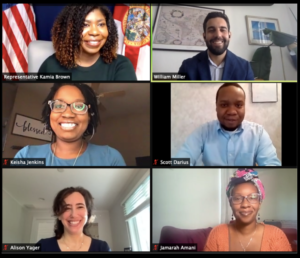
Coverage
WMFE (NPR Orlando): Health Advocates In Florida Renew Call For Postpartum Medicaid Extension
WFTV (ABC Orlando): Local Leaders and Advocates Call on State Senate to Pass Medicaid Coverage for New Mothers
WFTV (ABC Orlando): Local Leaders and Advocates Call on State Senate to Pass Medicaid Coverage for New Mothers
WFTV (ABC Orlando): Local Leaders and Advocates Call on State Senate to Pass Medicaid Coverage for New Mothers
WFTV (ABC Orlando): Local Leaders and Advocates Call on State Senate to Pass Medicaid Coverage for New Mothers
WMFE (NPR Orlando): Florida Lawmakers Negotiating Budget
WJCT (NPR Jacksonville): Florida Legislature in Final Stages of Negotiating Budget
WLRN (NPR Miami): Florida Legislature in Final Stages of Negotiating Budget
GEORGIA
Wednesday, April 14, 2021 — Medicaid Awareness Month Virtual Event with Georgia Healthcare Experts: Georgians for a Health Future, small business, faith, and health Advocates joined Protect Our Care Georgia for a virtual press conference to call on elected officials to pass Medicaid expansion. As calls for the Centers for Medicare & Medicaid Services to quickly formally disapprove of Georgia’s 1115 waiver continue, Georgia’s health care advocates are urging state leaders to drop costly legal battles and pass full Medicaid expansion. Laura Colbert, Executive Director at Georgians for a Healthy Future, described Medicaid expansion as a deal too good to pass up. “It has proven very successful in the other thirty eight states that have adopted it. Medicaid expansion improves health outcomes for adults, improves maternal and infant health, produces budget savings for states and reduces racial health inequities. Over 400 studies have been done that support these facts. The numbers speak for themselves and it’s time for our state to act,” Colbert said. You can watch the event here.

MAINE
Monday, April 12, 2021 — Medicaid Press Call with State Legislators and Advocates: State. Rep. Thom Harnett, Maine Alliance for Addiction and Mental Health Services, Maine Equal Justice, and Maine Consumers for Affordable Health Care joined Protect Our Care Maine for a press call to discuss how the American Rescue Plan strengthens Medicaid in Maine, and to highlight the critical role the program plays in providing health care in the state, including Mainers struggling as a result of the COVID-19 pandemic. Speakers called for greater federal support for Medicaid and its critical measures that help communities of color, LGBTQ+ individuals, indigenous communities, Mainers with disabilities, seniors, women and children all access care. State Rep. Harnett stressed, “it is crystal clear that Medicaid is vital to ensuring access to quality, affordable care, especially for communities of color. It is beyond time for Republicans to stop playing politics with their constituents’ health. By refusing to expand Medicaid in their states, Republicans are denying insurance to their most vulnerable populations. The American Rescue Plan gives holdout states yet another opportunity to do the right thing.” You can listen to an audio recording here.
NORTH CAROLINA
Tuesday, April 13, 2021 — Medicaid Awareness Month Virtual Event with State Rep. Linda Cooper-Sugggs, North Carolina Justice Center and Advocates: North Carolina leaders and health care advocates including Rep. Linda Cooper-Suggs and the North Carolina Justice Center joined Protect Our Care North Carolina for a virtual press conference to call on the North Carolina General Assembly to pass Medicaid expansion in the state. “The amount of money that would come into North Carolina from the American Rescue Plan’s incentives at the same time that we could save lives by covering more North Carolinians…what other choice do we have but to expand Medicaid?” said State Rep. Linda-Cooper Suggs. “This is an issue that’s personal to my family and my community,” said Matt Leatherman, whose daughter relies on Medicaid for coverage. “Expanding Medicaid is the evidently correct thing, both morally and fiscally.” You can watch the event here.

OHIO
Thursday, April 15, 2021 — Medicaid Awareness Month Virtual Event with U.S. Rep. Tim Ryan (D-OH-13), State Rep. Crawley and Advocates: Rep. Tim Ryan, State Rep. Eric Crawley and advocates joined Protect Our Care Ohio for a virtual press conference to discuss how the American Rescue Plan (ARP) strengthens Medicaid, including enhancements to postpartum care for Ohio women enrolled in Medicaid. Speakers also discussed the “Black Maternal Health Momnibus Act of 2021,” which would build on the ARP. U.S. Rep. Tim Ryan spoke about Democrats’ efforts to protect access to cost-effective coverage. “The American Rescue Plan secures coverage for more than 7 million additional Americans under the current law, but I am not stopping there, we must continue to work to shore up care for those who have been underserved in the past,” Ryan said. Kelsey Hopkins, Policy Associate at Groundwork Ohio, added, “Medicaid eligible pregnant women should be eligible for 12-month continuous postpartum coverage as included in the American Rescue Plan. It is a powerful tool in preventing infant and maternal mortality and morbidity.” You can watch the event here.

Coverage
WFMJ (NBC Youngstown): Rep. Tim Ryan and Advocates Discuss Medicaid Expansion and ARP Postpartum Provisions
WEST VIRGINIA
Wednesday, April 14, 2021 — Medicaid Awareness Month Virtual Event with West Virginians for Affordable Health Care, Planned Parenthood, Social Workers, and Advocates: Health care advocates joined Protect Our Care, WV for a virtual press conference to discuss how the American Rescue Plan strengthens Medicaid in West Virginia, and highlight the critical role the program plays in providing health care in the state, including those struggling as a result of the COVID-19 pandemic. Speakers also called out Senator Shelley Moore Capito, as well as Congressmen David McKinley, Alex Mooney and Congresswoman Carol Miller, for voting against the American Rescue Plan and its important Medicaid measures that help children, seniors, and West Virginians with disabilities access care. “The American Rescue Plan shows people that someone has their back by making health care more affordable, and providing support for the hard job of childcare and child rearing,” said Sam Hickman, Director of the West Virginia chapter of the National Association of Social Workers. “West Virginia was already seeing more people sign up for care under expanded Medicaid, without about 30,000 more people becoming eligible,” Hickman said, pointing out that with the resources included in the American Rescue Plan, even more West Virginians have access to care.” You can watch the event here.
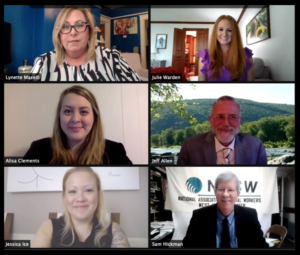
Coverage
Public News Service: WV Bill, American Rescue Plan Bolster Medicaid for Mountaineers
WISCONSIN
Tuesday, April 6, 2021 — Medicaid Awareness Month Virtual Event with U.S. Rep. Gwen Moore (D-WI-04), Lt. Governor Mandela Barnes, Wisconsin State Officials, and Advocates: Congresswoman Gwen Moore joined Citizen Action of Wisconsin and Protect Our Care for a virtual press event, along with Lt. Governor Mandela Barnes, State Representative Sara Rodriguez, and a school nurse, to call on the Wisconsin Legislature to pass BadgerCare expansion in the state budget. The event is part of Citizen Action of Wisconsin’s ongoing Week of Action in support of health care investments in the state budget and is part of Protect Our Care’s recognition of April as Medicaid Awareness Month. U.S. Rep. Gwen Moore underscored the fiscal implications for the state of Wisconsin if Republicans once again refuse to expand Badgercare, citing the Legislative Fiscal Bureau’s analysis that continued obstruction would cost the state more than $1.6 billion over just the next two years. “Here’s your opportunity to run government like a business,” she noted, “Instead, you’re leaving billions of dollars on the table.” You can watch the event here.
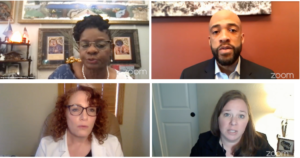
Thursday, April 8, 2021 — Medicaid Awareness Month Virtual Event with U.S. Senator Tammy Baldwin (D-WI), and Advocates: U.S. Senator Tammy Baldwin headlined a virtual media event hosted by Citizen Action of Wisconsin and Protect Our Care Wisconsin calling on Republicans to pass Medicaid expansion in the state. State Representative Jodi Emerson, a retired Wisconsin pediatrician, and home healthcare provider all joined the event to speak about the benefit of expanding Badgercare. In her remarks, U.S. Sen. Tammy Baldwin reminded viewers of the toll the pandemic has taken on so many families, noting the historic job loss and associated impacts of the employer based coverage system that defines American health care. “People in Wisconsin must have quality, affordable health care coverage during and after this crisis,” Baldwin said. “Wisconsin needs to accept the federal investment in Badgercare now.” You can watch the event here.
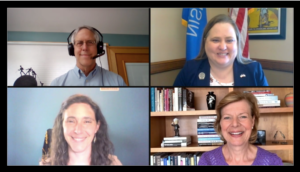
Coverage
WFRV (CBS Green Bay): Senator Baldwin Is Calling for Medicaid Expansion
WFRV (CBS Green Bay): Expanding Badgercare Debate
WFRV (CBS Green Bay): Calls to Expand Medicaid
WFRV (CBS Green Bay): Calls to Expand Medicaid
WFRV (CBS Green Bay): Calls to Expand Medicaid
WFRV (CBS Green Bay): Calls to Expand Medicaid
WisPolitics: U.S. Sen. Tammy Baldwin and State Rep. Jodi Emerson Slammed State Republican Lawmakers While Advocating for Medicaid Expansion


